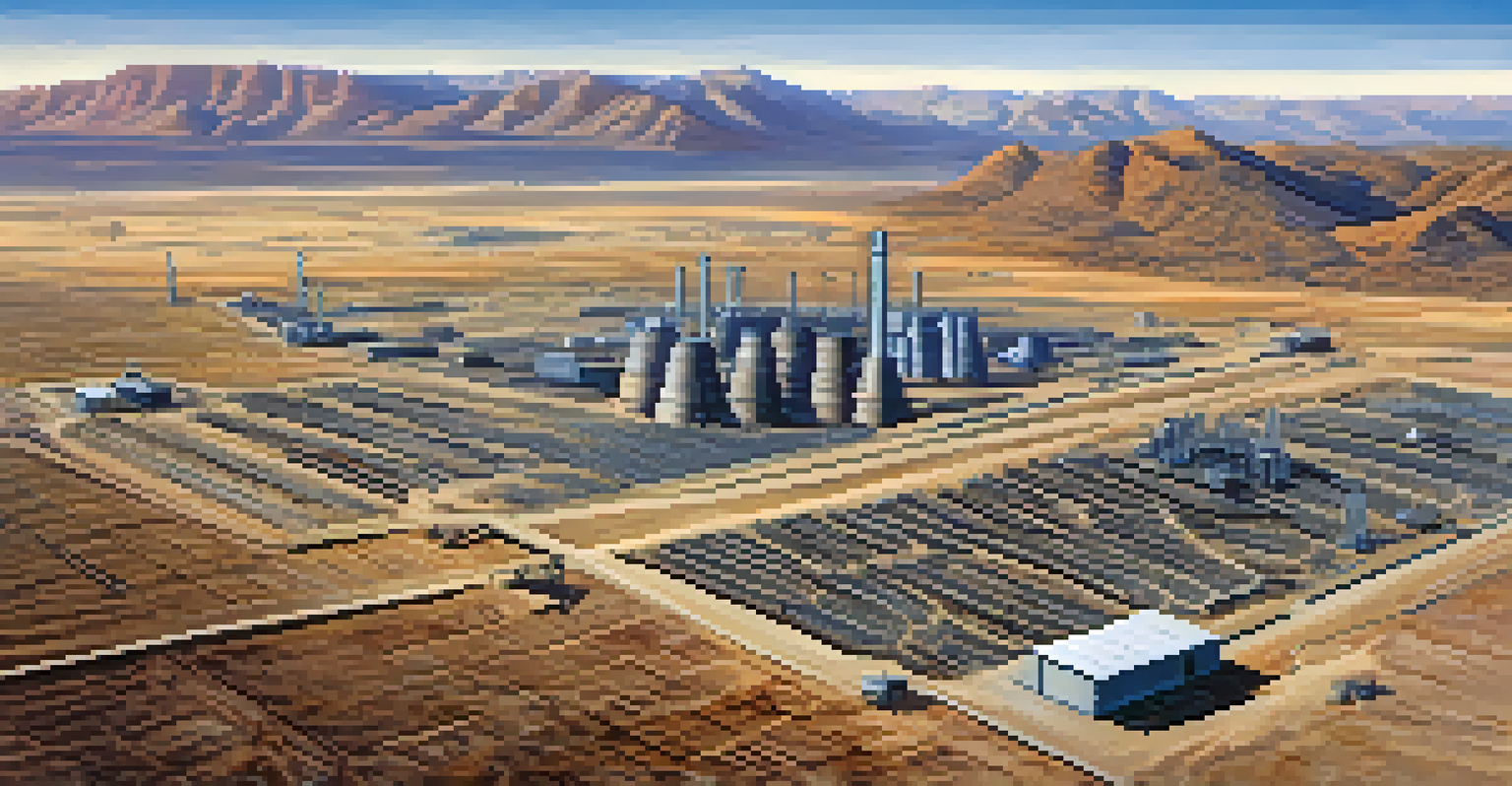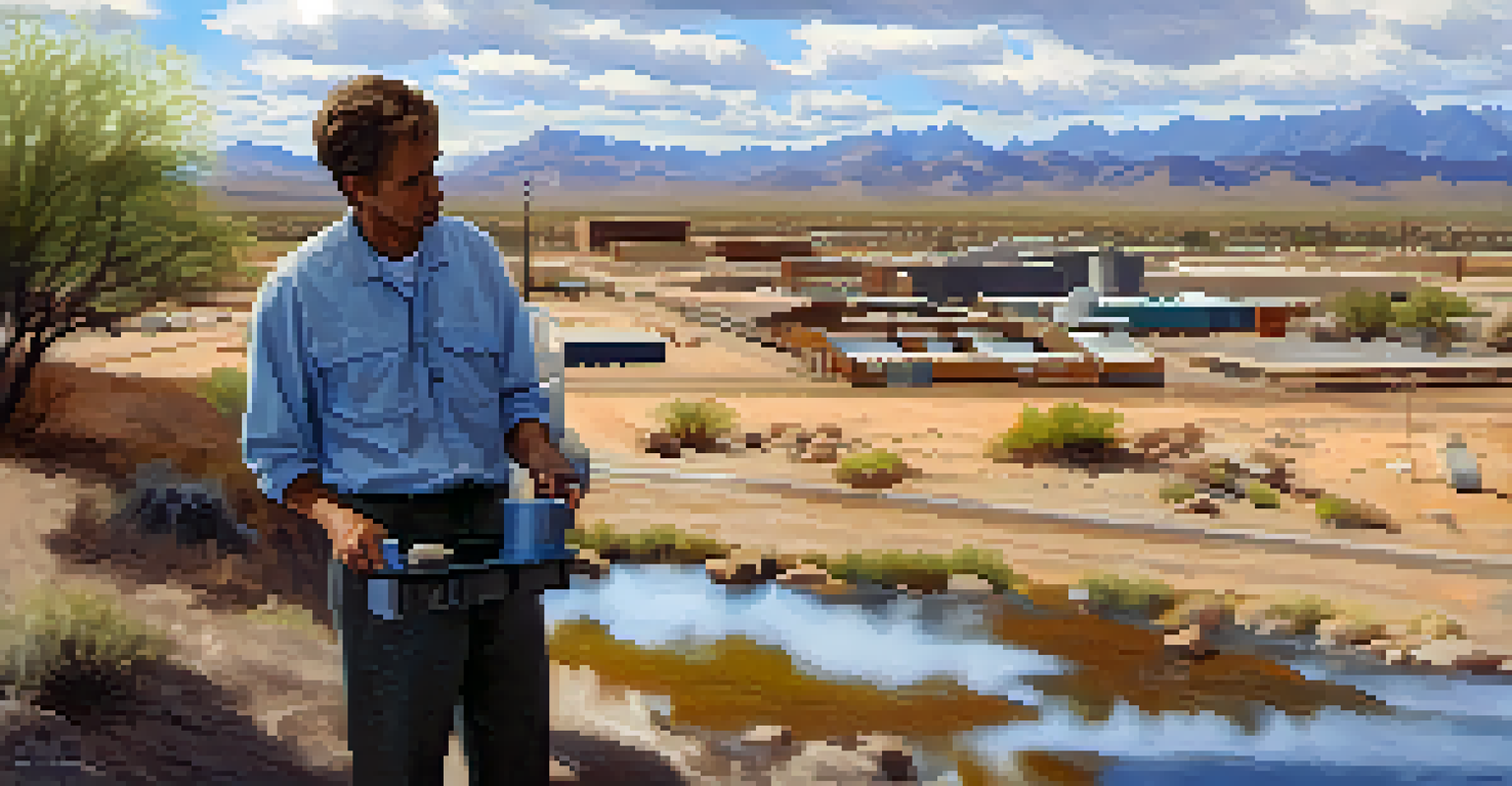Impact of Industrial Pollution on Arizona's Vulnerable Communities

Understanding Industrial Pollution and Its Sources
Industrial pollution refers to the harmful byproducts generated by manufacturing processes, which can severely impact air, water, and soil quality. In Arizona, industries such as mining, manufacturing, and energy production contribute significantly to this pollution. As these industries expand, they often release toxins that can affect not just the environment but also the health of nearby communities.
Environmental justice is not a special interest; it is a basic human right.
For instance, mining activities in areas like Arizona's copper mines have been linked to heavy metal contamination in local water supplies. This contamination poses serious health risks, particularly for vulnerable populations who may rely on these water sources for drinking and bathing. Understanding the sources of industrial pollution is crucial for assessing its impact on communities.
Furthermore, it's essential to recognize that industrial pollution doesn't affect everyone equally. Communities that are already facing socioeconomic challenges often bear the brunt of these environmental hazards, leading to disparities in health outcomes and quality of life.
Vulnerable Communities: Who Are They?
Vulnerable communities are often defined by factors such as low income, lack of access to healthcare, and limited political power. In Arizona, many of these communities are located near industrial sites, exposing them to elevated levels of pollution. This geographic proximity compounds their existing challenges and leaves them with fewer resources to combat the effects of pollution.

For example, Native American communities in Arizona frequently face environmental injustices due to nearby mining operations. These communities often struggle with inadequate infrastructure, making it difficult to address health issues stemming from industrial pollution. As a result, the impacts of pollution can exacerbate existing social and economic inequalities.
Industrial Pollution's Local Impact
Manufacturing processes in Arizona significantly contribute to industrial pollution, adversely affecting air, water, and soil quality.
Additionally, these communities may lack representation in decision-making processes, leaving them vulnerable to the whims of industrial expansion. It’s vital to highlight their stories and advocate for equitable policies that prioritize their health and well-being.
Health Impacts of Pollution on Vulnerable Populations
The health impacts of industrial pollution on vulnerable populations can be profound and far-reaching. Studies have shown that exposure to pollutants can lead to respiratory issues, cardiovascular diseases, and even developmental disorders in children. For communities already facing health disparities, these additional burdens can be devastating.
The health of our communities is directly tied to the health of our environment.
For instance, children living near industrial sites in Arizona may experience higher rates of asthma and lead poisoning. These health issues can hinder their educational performance and overall quality of life, creating a cycle of disadvantage. Additionally, adults in these communities may face chronic health conditions, leading to increased healthcare costs and reduced productivity.
Public health officials are increasingly recognizing the need for targeted interventions to address these disparities. By focusing on the unique challenges faced by vulnerable populations, we can work towards creating healthier environments and improving health outcomes.
Environmental Justice: A Call to Action
Environmental justice is the movement that seeks to address the inequitable distribution of environmental hazards, ensuring that all communities have the right to a healthy environment. In Arizona, this movement is crucial for advocating on behalf of vulnerable communities affected by industrial pollution. It aims to empower these communities and provide them with a platform to voice their concerns.
Grassroots organizations play a significant role in this movement by raising awareness and advocating for policy changes. They work tirelessly to highlight the stories of those most affected and push for regulations that hold industries accountable for their pollution. By amplifying these voices, we can foster a more equitable approach to environmental policy.
Vulnerable Communities at Risk
Low-income communities, particularly Native American populations in Arizona, face heightened exposure to pollution, exacerbating existing health and socioeconomic challenges.
Moreover, community engagement is essential for creating effective solutions. By involving local residents in decision-making processes, we can ensure that policies address the unique needs of vulnerable populations and create a more inclusive framework for environmental protection.
Regulatory Measures and Their Effectiveness
Regulatory measures play a vital role in controlling industrial pollution and protecting vulnerable communities. In Arizona, initiatives such as the Clean Air Act and the Clean Water Act aim to set standards for emissions and discharges from industrial facilities. However, the effectiveness of these measures often depends on enforcement and compliance.
While regulations exist, there are instances where industries may not adhere to them, leading to ongoing pollution issues. This lack of enforcement can disproportionately affect vulnerable communities, who may not have the resources to advocate for their rights. Strengthening regulatory frameworks and ensuring accountability is essential for safeguarding public health.
Moreover, collaboration between government agencies, industries, and communities is crucial for developing effective solutions. By working together, we can create a more comprehensive approach to managing industrial pollution and protecting the health of vulnerable populations.
Community Resilience and Adaptation Strategies
Despite the challenges posed by industrial pollution, many vulnerable communities in Arizona are demonstrating resilience and developing adaptation strategies. Community members are coming together to share resources, knowledge, and support, fostering a sense of solidarity. This grassroots approach can empower residents to advocate for their health and well-being.
For example, some communities are organizing health fairs and educational workshops focused on understanding pollution impacts and promoting healthy practices. These initiatives encourage residents to take proactive steps in managing their health and mitigating the effects of pollution. By prioritizing education and awareness, communities can build resilience against environmental hazards.
Need for Environmental Justice
Advocating for environmental justice is crucial to empower affected communities and ensure equitable health outcomes in the face of industrial pollution.
Additionally, collaboration with local organizations can enhance these efforts. Partnering with environmental groups can provide access to resources and expertise, helping communities navigate the complexities of industrial pollution and advocate for change.
The Path Forward: Advocating for Change
Advocating for change is critical in addressing the impact of industrial pollution on vulnerable communities in Arizona. This advocacy can take many forms, from grassroots campaigns to policy initiatives aimed at improving environmental regulations. By raising awareness and mobilizing support, we can push for more equitable solutions that prioritize the health of all residents.
Engaging with policymakers is also essential. By sharing the stories of those affected by industrial pollution, advocates can illustrate the urgent need for change. This personal touch can make a significant impact, driving home the importance of addressing environmental injustices.

Ultimately, the path forward requires collaboration among all stakeholders—communities, industries, and government agencies. By working together, we can create a healthier, more equitable Arizona where all residents have the opportunity to thrive.